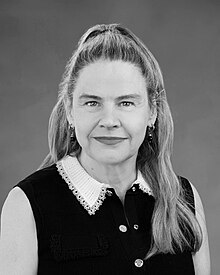Victoria Frances Nourse (born November 9, 1958) is the Ralph V. Whitworth Professor of Law[1] at Georgetown University Law Center and the executive director of its Center on Congressional Studies. She currently serves as vice chair of the United States Commission on Civil Rights as an appointee of President Joe Biden. She previously served as general counsel to the vice president under the Obama Administration. A nominee for the United States Court of Appeals for the Seventh Circuit, her nomination was returned to the president on December 17, 2011, after the Senate adjourned for more than 30 days.[2]

Nourse has published extensively on Congress, the separation of powers and statutory interpretation. She regularly appears as a legal expert on media outlets such as CNN, PBS and NPR, providing interpretation of national judicial and political developments.[3][4][5] Her recent scholarship and public commentary have centered on the trials and impeachments of Donald Trump, the Supreme Court, and current challenges facing American Democracy.
Early life and education
editNourse was born in Dunedin, Florida, grew up in Marblehead Massachusetts, and received her Bachelor of Arts from Stanford University Phi Beta Kappa in 1980 and later received a Juris Doctor from the University of California, Berkeley School of Law in 1984, where she was named to the Order of the Coif.[6]
Career
editEarly career
editAfter graduating from law school at UC Berkeley, Nourse clerked for Edward Weinfeld of the United States District Court for the Southern District of New York in 1984 and 1985. From 1985 to 1988, she worked in for the law firm of Paul, Weiss, Rifkind, Wharton & Garrison. In 1987 she worked as an assistant counsel on the United States Senate Committee to Investigate the Iran-Contra Affair.[7]
From 1988 to 1990, Nourse was an appellate attorney with the United States Department of Justice working in the civil division. From 1990 to 1993, she worked as counsel and special counsel for the United States Senate Judiciary Committee and played a key role in drafting the Violence Against Women Act (VAWA) under the leadership of then-Senator Joe Biden. Despite Senator Biden's public recognition of Nourse's contribution, national controversy was generated when he subsequently claimed to have authored the Act.[8]
Nourse's historic battle to uphold VAWA has been extensively documented in the media and books such as "Equal: Women Reshape American Law" by Fred Strebeigh.[9] The book included Nourse alongside Supreme Court Justice Ruth Bader Ginsburg as a woman who had a history-changing effect on the law.[10]
Academic career
editFrom 1996 to 1997, Nourse was a visiting professor of law at the University of Maryland School of Law. From 1997 to 2002, Nourse was an associate professor of law at the University of Wisconsin Law School. During the fall semester of 2002, she was a visiting professor of law at Yale Law School and taught law at New York University School of Law in the spring of 2003. Nourse returned to the University of Wisconsin Law School from 2005 until 2008 as the Burrus-Bascom Professor. From 2008 to 2010, Nourse was the LQC Lamar Professor of Law at Emory University School of Law in Atlanta.[7]
In February 2019, Nourse was installed as the inaugural Ralph V. Whitworth Professor of Law at the Georgetown University Law Center.
Consideration for the Seventh Circuit
editOn January 22, 2010, United States senators Herb Kohl and Russ Feingold forwarded four names to the Obama White House for consideration to fill the vacancy on the Seventh Circuit Court of Appeals created when Judge Terence T. Evans assumed senior status.[11] Nourse was recommended along with District Court Judge Lynn Adelman, Richard Sankovitz, and Dean Strang.[11] On July 14, 2010, Obama nominated Nourse to the vacancy. Her nomination was returned to the President on December 17, 2011, pursuant to the rules of the Senate.[2]
United States Commission on Civil Rights
editOn March 16, 2023, Nourse was sworn in as a presidential appointee to the United States Commission on Civil Rights for a term of six years. On July 21, 2023, pursuant to her designation by President Biden, she was installed as Vice Chair of the commission by unanimous vote.[12] Addressing her designation as Vice Chair in April 2023, Nourse spoke of President Biden's longstanding influence on her political philosophy: "He taught me everything I know about bipartisanship... I know that we can work together. I've done it before." [13]
Personal
editNourse is married with two children. She was the daughter-in-law of United States federal judge Richard D. Cudahy.[7]
See also
editReferences
edit- ^ "Victoria Nourse Installed as the Inaugural Ralph V. Whitworth Professor". law.georgetown.edu. Georgetown University Law Center. Retrieved November 24, 2019.
- ^ a b "Senate Record for December 17, 2011". Archived from the original on July 4, 2016. Retrieved December 18, 2011.
- ^ https://www.npr.org/transcripts/796735042
- ^ "Opinion: Why codifying Roe will land right back at the Supreme Court". CNN. 30 June 2022.
- ^ "How these 2 legal scholars see Amy Coney Barrett's testimony". PBS. 14 October 2020.
- ^ "Victoria Nourse's University of Wisconsin Faculty Page". Archived from the original on October 26, 2009. Retrieved September 18, 2009.
- ^ a b c "Questionnaire for Judicial Nominees" (PDF). United States Senate Committee on the Judiciary. United States Senate. Retrieved November 24, 2019.
- ^ Cliff Kincaid (September 10, 2007). "Senate Embarrassments Joe Biden and Larry Craig". Accuracy in Media. Retrieved November 24, 2019.
- ^ Strebeigh, Fred (2009). Equal on Google Books. W. W. Norton & Company. p. 352. ISBN 978-0393065558.
- ^ Rutgers University Symposium on "Equal" by Fred Strebeigh
- ^ a b Adam Korbitz, Kohl, Feingold forward four names to President Obama for Seventh Circuit State Bar of Wisconsin (January 25, 2010). Retrieved November 24, 2019.
- ^ https://www.usccr.gov/files/2024-01/july-bis-meeting-transcript-2023.pdf
- ^ https://www.usccr.gov/files/2023-04/0421-usccr-business-meetingtranscript.pdf